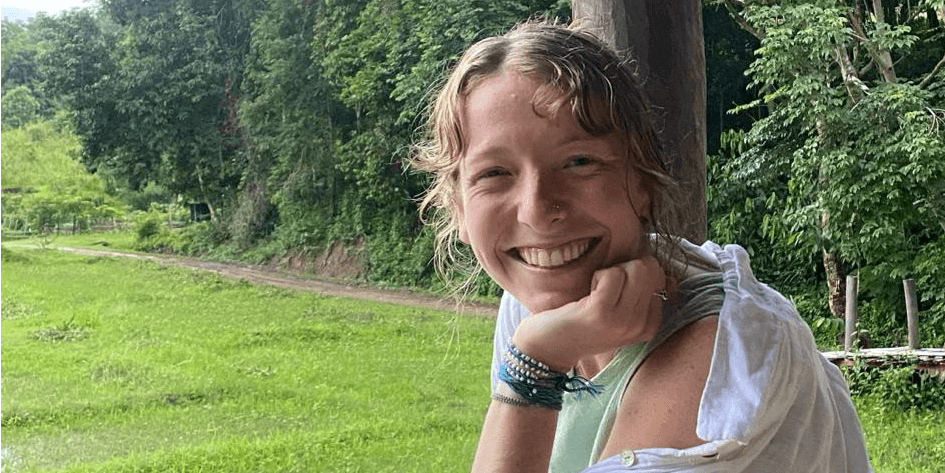Colleen McGuiness, Global Development Student

Hello Colleen, thank you for accepting this interview. First, can you tell us a bit about yourself and why did you choose to study the MSc in Global Development?
I’m Colleen I’m 25 and I’M from the US. I studied international sustainable development before. Well… it’s a very personal life choice but I think it’s very important to know about the world, current conflicts and different cultures and life people have. I wanted to make my work meaningful - which is kind of a silly thing to say – but I didn’t want to work just for making money, I wanted to use my time to help people. However, I also realized that global development hasn’t always been that way, but there are ways to do it right, specially if you work with the people in different contexts.
Right now you are not in Copenhagen, where are you and what are you doing?
I’m taking the Borderland Field Course in Chiang Mai, Thailand. We have a lectures series the first week, we went to class from 9 to 5, and I learnt the most about generic borderland conflicts from environmental conflicts in the amazon, to Syrian refugee crises. We each did an internship for two weeks, mine was not in an NGO, as its difficult to give all students an internship in an NGO and most of them don’t want people for such a short period of time. I got paired with a professor and did a lot of independent research and got a lot out of it. This professor was focused on displaced people, specially Rohingya people that are prosecuted, and a lot are now living in Thailand. In this course there’s 5 students from Chiang Mai University and most of them are coming from Myanmar to scape the political situation there, so it’s been interesting to learn about the conflict there from their experiences.
What motivated you to take Borderland course?
I have never turned down an opportunity to travel, and the University of Copenhagen has a lot of great opportunities for seeing the world at a low cost. I didn’t know before, but this program has a stipend of 8000kr so I got to go to Thailand for cheap. Global development is super broad, and we never get to focus on one thing, and this course was very focused on migration; I learnt about refugee law, history of refugee conventions across international organizations and that has been very beneficial, and I have enjoyed a lot. I think it has inspired me for my thesis, I want to write now about the US Mexico border, and I thought I was not interested in the topic of migration, I thought I was more interested in the topic of education, but as we learnt about nation states, I realized borders are just line, but humans are meant to be mobile.
Now that you are almost done with this experience, what do you think it has been the most positive aspect of it?
I think studying with migrants from Myanmar and hearing their life experiences and how dangerous it can be to be political – which was something I didn’t think about. A lot of students are political and are targeted by the Juntas. In Global Development we are mostly from the Global North, so it was interesting to study with people from the Global South. I was lucky to connect with them outside class during my internship, I had a person from Myanmar and got to meet them in a personal level.
How can you apply the knowledge that you have gained in this course to your professional career in the future?
As I’m writing my research proposal, that knowledge is very transferable to writing my thesis and it would also be very useful if I were to do a PhD – which I’m not going to do. For me I’ve been inspired to look at borderland conflicts everywhere and it has also made me NOT want to do research. There was this one line that hit me from one of the readings: how do you justify your PhD? You’re getting money for studying this conflict every year and how do you justify not giving that cash flow to the community. It has to be research that 1. Knowledge gets translated back to the native language of the community or 2. You really give something to help them. It is a luxury to build your academic career at the expense of migrants or refugees, so this experience has made me think more critically about what research is usable and justifiable.
How has this experience shaped you, not only professionally but also personally?
I think it has made me appreciate where I’m from, it makes you reflect on your positionality as well. Sometimes I thought I had to hold myself back because I felt like I needed to give the space because in a classroom sometimes Europeans dominate, but I really learnt to let the people speak for themselves. It would be unfortunate saying that I will go back to a comfortable Denmark and forget about it, but I think I won’t – this conflict has made me realize how important it is to learn about conflicts like this and make people aware of struggles like this that are fully dependent on finance from the global north. You have to learn to just not assume things, let people share what they want to share and just take less space in these settings! In general, this was a very useful course, the city is incredible and super safe, Thai people are so friendly. I would highly recommend anyone to spend one month in Chiang Mai.
